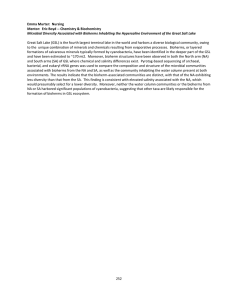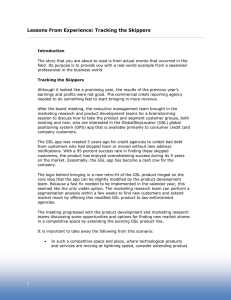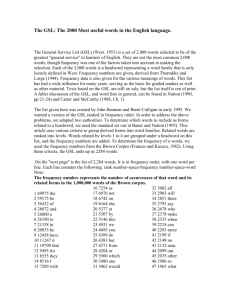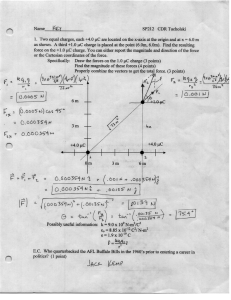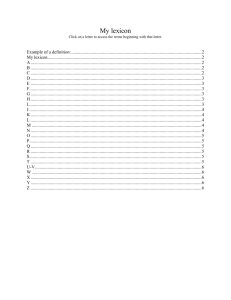autocorrelation_test.cpp autocorrelation_test.cpp
advertisement
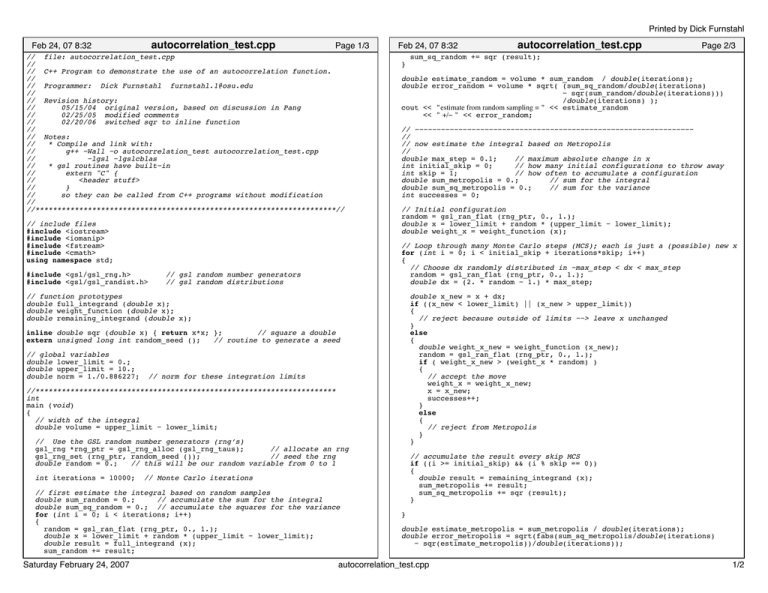
Printed by Dick Furnstahl
autocorrelation_test.cpp
Feb 24, 07 8:32
Page 1/3
// file: autocorrelation_test.cpp
//
// C++ Program to demonstrate the use of an autocorrelation function.
//
// Programmer: Dick Furnstahl furnstahl.1@osu.edu
//
// Revision history:
//
05/15/04 original version, based on discussion in Pang
//
02/25/05 modified comments
//
02/20/06 switched sqr to inline function
//
// Notes:
//
* Compile and link with:
//
g++ éWall éo autocorrelation_test autocorrelation_test.cpp
//
élgsl élgslcblas
//
* gsl routines have builtéin
//
extern "C" {
//
<header stuff>
//
}
//
so they can be called from C++ programs without modification
//
//*********************************************************************//
// include files
#include <iostream>
#include <iomanip>
#include <fstream>
#include <cmath>
using namespace std;
#include <gsl/gsl_rng.h>
#include <gsl/gsl_randist.h>
Feb 24, 07 8:32
}
// éééééééééééééééééééééééééééééééééééééééééééééééééééééééééééééééé
//
// now estimate the integral based on Metropolis
//
double max_step = 0.1;
// maximum absolute change in x
int initial_skip = 0;
// how many initial configurations to throw away
int skip = 1;
// how often to accumulate a configuration
double sum_metropolis = 0.;
// sum for the integral
double sum_sq_metropolis = 0.;
// sum for the variance
int successes = 0;
// Initial configuration
random = gsl_ran_flat (rng_ptr, 0., 1.);
double x = lower_limit + random * (upper_limit é lower_limit);
double weight_x = weight_function (x);
// Loop through many Monte Carlo steps (MCS); each is just a (possible) new x
for (int i = 0; i < initial_skip + iterations*skip; i++)
{
// Choose dx randomly distributed in émax_step < dx < max_step
random = gsl_ran_flat (rng_ptr, 0., 1.);
double dx = (2. * random é 1.) * max_step;
// gsl random number generators
// gsl random distributions
double x_new = x + dx;
if ((x_new < lower_limit) || (x_new > upper_limit))
{
// reject because outside of limits éé> leave x unchanged
}
else
{
double weight_x_new = weight_function (x_new);
random = gsl_ran_flat (rng_ptr, 0., 1.);
if ( weight_x_new > (weight_x * random) )
{
// accept the move
weight_x = weight_x_new;
x = x_new;
successes++;
}
else
{
// reject from Metropolis
}
}
inline double sqr (double x) { return x*x; };
// square a double
extern unsigned long int random_seed ();
// routine to generate a seed
// norm for these integration limits
//*********************************************************************
int
main (void)
{
// width of the integral
double volume = upper_limit é lower_limit;
// Use the GSL random number generators (rng’s)
gsl_rng *rng_ptr = gsl_rng_alloc (gsl_rng_taus);
// allocate an rng
gsl_rng_set (rng_ptr, random_seed ());
// seed the rng
double random = 0.;
// this will be our random variable from 0 to 1
int iterations = 10000;
// accumulate the result every skip MCS
if ((i >= initial_skip) && (i % skip == 0))
{
double result = remaining_integrand (x);
sum_metropolis += result;
sum_sq_metropolis += sqr (result);
}
// Monte Carlo iterations
// first estimate the integral based on random samples
double sum_random = 0.;
// accumulate the sum for the integral
double sum_sq_random = 0.; // accumulate the squares for the variance
for (int i = 0; i < iterations; i++)
{
random = gsl_ran_flat (rng_ptr, 0., 1.);
double x = lower_limit + random * (upper_limit é lower_limit);
double result = full_integrand (x);
sum_random += result;
Saturday February 24, 2007
Page 2/3
double estimate_random = volume * sum_random / double(iterations);
double error_random = volume * sqrt( (sum_sq_random/double(iterations)
é sqr(sum_random/double(iterations)))
/double(iterations) );
cout << "estimate from random sampling = " << estimate_random
<< " +/ï " << error_random;
// function prototypes
double full_integrand (double x);
double weight_function (double x);
double remaining_integrand (double x);
// global variables
double lower_limit = 0.;
double upper_limit = 10.;
double norm = 1./0.886227;
autocorrelation_test.cpp
sum_sq_random += sqr (result);
}
double estimate_metropolis = sum_metropolis / double(iterations);
double error_metropolis = sqrt(fabs(sum_sq_metropolis/double(iterations)
é sqr(estimate_metropolis))/double(iterations));
autocorrelation_test.cpp
1/2
Printed by Dick Furnstahl
Feb 24, 07 8:32
autocorrelation_test.cpp
Page 3/3
cout << endl;
cout << " estimate from metropolis = " << estimate_metropolis
<< " +/ï " << error_metropolis << endl;
cout << "Metropolis acceptance rate: "
<< double(successes) / double(iterations*skip)
<< endl;
return 0;
}
//*********************************************************************
double
full_integrand (double x)
{
return ( norm * sqr(x) * exp(ésqr(x)) );
}
//*********************************************************************
double
weight_function (double x)
{
return ( exp(ésqr(x)) );
}
//*********************************************************************
double
remaining_integrand (double x)
{
return ( sqr(x) );
}
//*********************************************************************
Saturday February 24, 2007
autocorrelation_test.cpp
2/2
